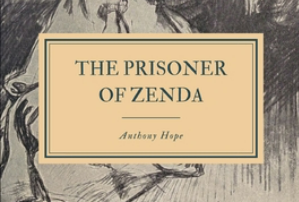Chapter 19 — The Prisoner of Zenda
byChapter 19 – The Prisoner of Zenda begins with a tense standoff at the edge of a forest, where Rupert Hentzau, bruised but bold, confronts the Duke’s men in a last-ditch act of defiance. He stands with a sword in hand and his usual air of dangerous charm, seemingly unfazed by the odds stacked against him. Watching from a hidden vantage point is the narrator, still in the guise of the King, torn between the impulse to act and the code of honor he cannot quite break. Though he holds the advantage and could end the threat with a single shot, something—be it a sense of justice or a fascination with Rupert’s fearlessness—halts his hand. In that moment, even enemies feel bound by an unspoken rule: to face one another openly, not in secret. But fate has its own rhythm, and it quickens with a scream from within the castle walls.
That scream heralds the news that Duke Michael lies dead, his grip on power finally broken. Rupert, with his typical flair, attempts to seize control in the chaos, but the arrival of Antoinette de Mauban changes the course of events. Driven by a cocktail of heartbreak and revenge, she confronts Rupert with pistol drawn. He refuses to raise a hand against her, quoting his twisted chivalry—he would not harm a woman he has once kissed. This line, laced with both arrogance and sorrow, reveals a code that is as erratic as Rupert himself. Rather than risk being shot, he dives into the castle’s moat, choosing escape over confrontation. This act becomes a turning point, not only for the battle at hand but for the emotional stakes carried by those involved.
The narrator, stirred into action, races after Rupert with determination burning in every step. The chase through the castle grounds is uneven. Rupert, untouched by the physical toll the narrator has endured, keeps ahead with ease. The pursuit becomes symbolic—a race not just between two men but between two ideals: reckless ambition and principled resolve. As they break into the open forest, the gap between them widens, not only in distance but in strength. A peasant girl on horseback unwittingly aids Rupert’s escape, allowing him to vanish into the landscape once more. Despite every effort, justice remains just out of reach, a reminder that victory rarely comes without complication.
Just when the narrator feels the moment slipping from his grasp, Fritz von Tarlenheim arrives with reinforcements. Yet even then, Rupert pauses only to flash a final, mocking smile before disappearing into the trees. His bow is not one of surrender, but a promise that their story is not over. In this exchange, no one wins. The villain escapes, the hero is left bruised, and Ruritania teeters between stability and uncertainty. Still, the fight is not for nothing. Though Rupert is gone, the Duke’s reign has ended, and the King is safe. But there remains a hollow note—unfinished business that neither sword nor crown can resolve.
The chapter’s emotional tension is as sharp as the blades drawn in battle. It underscores the sacrifices made in silence, the private battles fought beneath public victories. The narrator, having risked everything, now carries more than scars—he holds unresolved grief, enduring love, and a rivalry that continues to haunt him. Rupert’s escape doesn’t diminish the heroism of the moment, but it does complicate it. The audience is reminded that honor isn’t measured solely in triumph, but in the choices made when no one is watching. And sometimes, it’s not about ending the story, but ensuring it’s told truthfully—even when justice slips through your fingers.
As the dust settles, the lingering feeling is not closure, but anticipation. Rupert’s charm and ruthlessness have left a mark, not only on the kingdom but on the hearts of those who stood against him. The narrator knows this is not the last they’ll meet. What remains is a fragile peace—held together by sacrifice, by masks removed, and by the bitter knowledge that in love and war, nothing is ever truly finished.


